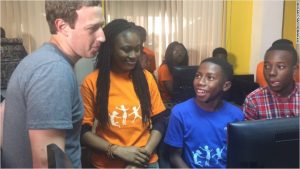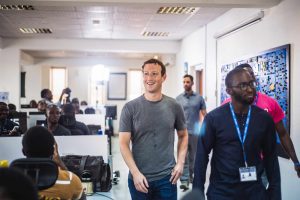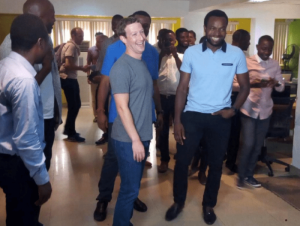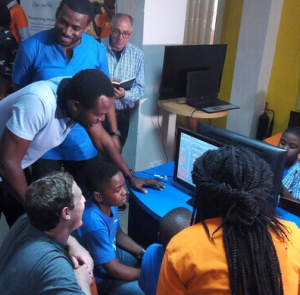1. Mentor young entrepreneurs: There is a lot of lack of meritocracy in Nigerian business environment. Only earlier this year several of the most important organizations in Nigeria, the National Petroleum Corporation, the Federal Revenue Service, and other agencies were caught amid a recruitment scam where the children and cronies of the corrupt political elite were given plum jobs.

So for young Nigerian entrepreneurs, technology provides an opportunity to cross the divide from failure to success, using mental acuity.
Few techpreneurs command the presence, respect and admiration that Mark Zuckerberg does, so his personal presence in Lagos meeting with several young aspiring developers in summer boot camps, young women techpreneurs and other miscellaneous techies is a big boost to the African tech scene.
Mark wrote on his wall: “I’ll be meeting with developers and entrepreneurs, and learning about the startup ecosystem in Nigeria. The energy here is amazing and I’m excited to learn as much as I can.
“Our first stop is the Co-creation Hub Nigeria (CcHUB) in Yaba. I got to talk to kids at a summer coding camp and entrepreneurs who come to CcHub to build and launch their apps. I’m looking forward to meeting more people here!”
2. Check his investments: The Chan Zuckerberg initiative,a non-profit organization set up by the first family of tech invested $24 million in Andela, a Nigerian owned start up that trains young people in Lagos and Nairobi to become software developers.
Mark also stopped by to see how Internet.org is doing.



3. Sell some new product: According to its official website, Internet.org is a Facebook-led initiative with the goal of bringing internet access and the benefits of connectivity to the two-thirds of the world that doesn‘t have it.
The popular service was notably banned by India’s regulators. According to this Wired article from February, “India’s telecom regulator has blocked the company’s Free Basics service as part of a ruling that supports net neutrality.
“In effect, regulators are banning “zero-rating,” the practice of exempting some Internet-usage from the data cap that covers other services. Regulators say that by working with telecom companies to make some services free, and not others, Facebook’s Free Basics unfairly helps some Internet services while disadvantaging others.”
4. Engage with its biggest market in sub-Saharan Africa: With 15 million estimated users as at last count, Nigeria is one of the biggest markets for Facebook in the world, and with only about 90 million people or 50% of Nigeria’s population connected to the internet, that number is destined to grow consistently over time. Growth will certainly be affected by the deployment of key technologies his company has in beta or in production.
5. Learn about the heritage of some of Facebook’s top employees:



![]()
![]()
![]()
![]()
![]()
![]()
![]()
![]()
![]()
As a savvy employer, you automatically take interest in the heritage of your top talent. Mark undoubtedly wanted to see the environment that produced some of his top gurus at Facebook. Granted a lot of them may have honed their skills abroad, but there are values that can only be instilled from one’s motherland. Mark certainly got a first hand glimpse of this.
6. Leave an impression: In Nigeria form is almost always regarded as premium to substance. A visit from Mark Zuckerberg in all his simplicity, and humility sets the tone for a different narrative than the one many young Nigerians have become accustomed to over the years. Mark went to visit the Pope and then came to visit Nigeria.



The Tech Messiah who holds the major key to virtually all global contemporary connectivity needs walked the streets of Lagos with no fanfare, display of wealth or power. Dressed in his trademark flea market outfit, Mark’s visit to Nigeria shouts loud and clear, “Knowledge is power.”



Leave a Reply